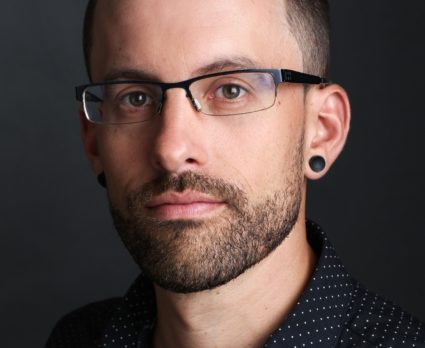
Why the author of 'American Prison' embraces people's contradictions
Our February pick for the PBS NewsHour-New York Times book club "Now Read This" is Shane Bauer's "American Prison." Become a member of the book club by joining our Facebook group, or by signing up to our newsletter. Learn more about the book club here.
For "American Prison," a deep dive into the private prison industry, Shane Bauer drew from historical documents dating back to the 19th century. But first he followed a valuable piece of writing advice: "Let the story lead."
"It's important to immerse in your topic, to know everything you can about it, but that is just the first stage of a good nonfiction project," Bauer told the PBS NewsHour. "The real work is finding a narrative that exists inside that topic."
For Bauer, that narrative came from working as a prison guard and learning from all of the people he encountered there.
That also meant embracing the contradictions embodied by the inmates and fellow officers alike. "Don't force characters into the framework you've created in your mind, let them lead you, even when they do things you wish they didn't," said Bauer. "It will make your writing much better in the end."
Below, Bauer shares more on his writing routine, and what inspires him.
What is your daily writing routine?
It depends. I go through long periods of reporting where I do very little "writing." During these stretches, there is no routine. I try to squeeze out time in cafes, airplanes, and hotel rooms to organize my notes and imagine scenes. I try to find the shape of the story and make sure that when I'm eventually ready to write, I'm not lost in my material.
My actual writing routine is always evolving. I grew up in a working-class family and I've generally approached writing the same way I once approached welding: Wake up, drink coffee, eat breakfast, start working by 9, take a lunch break, and keep going till 5. I write on the weekends only if I have to meet a deadline.
This clock-in, clock-out approach has become less rigid over time, largely because I've discovered the value of writing at night. I do the best writing when my mind is still, and it is the stillest after dark. I sit down in my living room, light a fire, and read a novel. Eventually, I become seized with a burning need to write. I've been writing first drafts by hand lately, which I find helps the thoughts flow better than they do when I'm facing a computer screen. After a couple hours of scribbling, I go to sleep. When I wake up, I type up what I wrote, edit, fact check, and do any research I need to set myself up for the next writing session.
What is your favorite childhood book? Or one book you think everyone should read?
I have very few favorites in general. Different things have different types of value. How does one compare "The Grapes of Wrath" and "The Fire Next Time"? Both are essential American classics, but I couldn't rate one above the other.
Similarly, I don't have a favorite childhood book. I grew up in rural Minnesota and I spent a lot of time in the woods with animal tracking books. I also remember being completely taken by "The Lion, the Witch, and the Wardrobe." I think C.S. Lewis said the book would help children accept Christianity into their lives when they were older. That didn't work for me.
What is something you've seen, watched or read that you think is overlooked and deserves more attention?
Historian Daniel Rasmussen wrote a nice book called" American Uprising: The Untold Story of America's Largest Slave Revolt." It details the 1811 German Coast Uprising in Louisiana, a piece of American history that is all but forgotten. An enslaved man of Haitian descent attacked the masters of the mansion and made off with muskets. His band of slaves marched from one plantation to the next, killing or chasing away the owners and picking up more fighters. For two days they marched toward New Orleans, aiming to take the city. The revolt was ultimately crushed and many of its participants were executed. This was the biggest slave revolt in America, ever. It should be taught in our history classes.
What is the best piece of writer's advice you've received?
"Let the story lead."
So many nonfiction writers let the topic lead the writing, rather than the story and its characters. It's important to immerse in your topic, to know everything you can about it, but that is just the first stage of a good nonfiction project. The real work is finding a narrative that exists inside that topic. Don't search for characters that perfectly embody your thesis. Search for people with rich stories. People are complicated and their lives, outlooks, and actions will contradict your thesis at times. These contradictions should be embraced. Don't force characters into the framework you've created in your mind, let them lead you, even when they do things you wish they didn't. It will make your writing much better in the end.
Can you describe the moment you knew you wanted to write this particular book? And when did you know it was over?
When I began working as a prison guard, my intention was to write an article for Mother Jones. A few days into training, I realized that I already had enough material for a good article. A couple months in, I knew it needed to be a book. My time working in the prison came to a dramatic end, so it was obvious that the book should end there. But after writing the whole story of my time undercover, I felt the book needed more depth.
I looked into the founders of the private prison company and learned that one had started his career running a plantation prison in Texas, where prisoners were forced to pick cotton all day. I learned that those plantations were once run at a profit and even further back in history, they were slave plantations. I kept going further and further back until I realized I needed to start at the foundation of this country and trace the story of profit in the American prison system from there. I spent a year researching and writing that history and when I finished, I knew the book was done.
Support Canvas
Sustain our coverage of culture, arts and literature.
















